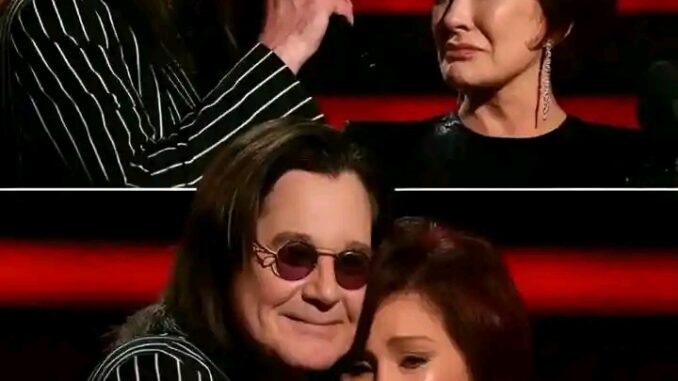
After decades of wild nights, sold-out arenas, and a life lived at full volume, Ozzy Osbourne faced the moment every music legend dreads—his final concert. It wasn’t just the end of a tour or the close of a chapter; it was the last thunderous chord in a symphony that had started half a century ago. And while the crowd of 40,000 roared with the feverish devotion only a lifetime of rock can command, no one—not even the most hardened fans—was ready for what came next.
Ozzy, the Prince of Darkness, had been many things to many people. To fans, he was the iconic frontman of Black Sabbath, the solo superstar, the outrageous personality on MTV. To critics, he was unpredictable, a survivor, sometimes misunderstood, but always unforgettable. To tabloids, he was a headline. But in those final minutes of his last show, as the stage lights dimmed and the band played the final notes of “Mama, I’m Coming Home,” all of that noise faded.
What remained was the man.
Ozzy’s once-raspy growl had softened. He stood in the spotlight, his figure slightly stooped, the years of physical wear visible in his posture. But his spirit—always defiant, always real—shone brighter than any pyrotechnic blast. He looked out over the sea of faces one last time, then leaned into the microphone.
“This one’s not for me,” he said quietly, his voice cracking with emotion. “It’s for Sharon.”
The crowd fell into a stunned silence. The larger-than-life rock icon was shedding his armor before their eyes. And then, in a moment that felt both impossibly personal and unforgettably epic, Ozzy reached for his wife’s hand and brought her onstage.
Sharon Osbourne, the woman who had been his partner through every rise and fall, every rehab, relapse, and resurrection, stepped into the spotlight. They had faced battles most couples could only imagine: addiction, cancer, fame, betrayal, health scares. Through it all, Sharon had remained Ozzy’s rock, manager, soulmate, and fiercest protector.
She tried to smile—but the tears came first. So did Ozzy’s. So did the crowd’s.
What followed wasn’t rehearsed. It wasn’t choreographed or filtered. It was real. Raw. Human. Ozzy wrapped his arms around Sharon and held her tightly. “I wouldn’t have made it without her,” he whispered. “None of this. None of me. She saved me.”
The audience erupted—not in a typical roar of applause, but in a swelling, emotional ovation. The kind that comes from witnessing something historic and deeply human at the same time. Phones lit up the arena, capturing not just the end of an era, but the purest love story rock and roll had ever told.
There was no encore after that. There didn’t need to be. Ozzy Osbourne, the man who had once bitten the head off a bat onstage, who had defied every odd, every critic, and even mortality itself, walked off not as a myth—but as a husband, hand-in-hand with the love of his life.
That final bow wasn’t about fame, or ego, or even music. It was about gratitude. About love. About the journey.
And as the stage faded to black, the crowd didn’t chant for more. They stood in quiet reverence, holding their breath and their tears, knowing they had just witnessed something far greater than a rock concert. They had seen the curtain close not only on a career—but on a lifetime of chaos and survival that somehow, beautifully, always circled back to love.
In the end, Ozzy’s loudest moment wasn’t a scream. It was a whisper: “It’s for Sharon.” And somehow, that was the most rock and roll thing he ever did.
Leave a Reply